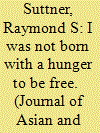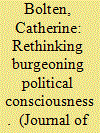| Srl | Item |
| 1 |
ID:
143332


|
|
|
|
|
| Summary/Abstract |
There is a stark contrast between Nelson Mandela the freedom fighter and the young man who grew up in rural Transkei without a ‘hunger to be free’. Until entering Johannesburg in 1941, he generally did not recognise or resist white oppression. Mandela was destined to be counsellor to the future abaThembu king, not a leader himself. Nevertheless, he encountered discordant notes, suggesting that he could not be a man as long as Africans were a conquered people. His consequent transition to manhood remained unresolved until his involvement in the defiance of the apartheid regime, which signified the attainment of his manhood that had been denied to him in earlier life.
|
|
|
|
|
|
|
|
|
|
|
|
|
|
|
|
| 2 |
ID:
156676


|
|
|
| 3 |
ID:
129544


|
|
|
|
|
| Publication |
2014.
|
| Summary/Abstract |
National education keeps and develops culture, which is responsible for a politically stable society. Advanced culture, as the pillar of a constant and creative political consciousness, preserves the ideal of national accord.
|
|
|
|
|
|
|
|
|
|
|
|
|
|
|
|
| 4 |
ID:
092990


|
|
|
| 5 |
ID:
132106


|
|
|
|
|
| Publication |
2014.
|
| Summary/Abstract |
The major foreign concessions granted in the reign of Nasser al-Din Shah Qajar have received considerable attention, none more so than the Tobacco Rebellion, which is generally viewed as a watershed event in the awakening of political consciousness in Iran. Although mentioned in most of the published material on the precedents of the Constitutional Revolution of 1906, a revised narrative of the tobacco rebellion is overdue. This paper fills the gaps and revises some of the widely held assumptions on the forces that unleashed a nationwide movement that almost brought down the Qajar dynasty. The emphasis is on the incendiary protests in Tabriz and the largely neglected role of Hajj Kazem Malek-al-Tojjar. This article, which is the fifth of a series by the author on the two Malek-al-tojjar-e mamalek-e mahrusa of the Qajar era, questions the authorship of the fatwa (hokm) and re-assesses the motivation for its hasty proclamation and dissemination. In other words, were the "sensation-seekers" the heroes of reform or is there a neglected version to extricate from the truths and half-truths propounded about this watershed event?
|
|
|
|
|
|
|
|
|
|
|
|
|
|
|
|
| 6 |
ID:
138747


|
|
|
|
|
| Summary/Abstract |
It is not easy to say what proportion of Hong Kong residents support democratization. Although the overwhelming majority of Hong Kong people support universal suffrage of the chief executive, public opinion in Hong Kong is divided into two opinions about whether they should accept the Chinese-style of democracy in which candidates are selected before election by the Chinese Central Government to exclude pro-democracy camp candidates. The majority of Hong Kong citizens do not want a person from the pro-democracy camp who is not on good terms with the central government to become the chief executive, and the “Occupy” movement was not welcomed because of prolonged occupation of the major streets. It is not easy for the pro-democracy camp to persuade conservative ordinary people to support full-democracy, and even if they succeed in changing public opinion, the central government and mainland people will become the next obstacle. The future perspective of Hong Kong's democratization is not bright, but young people's demand for democracy is very strong and they may well change Hong Kong society. It may also be possible that a wave of political consciousness among the young could eventually also sweep mainland China.
|
|
|
|
|
|
|
|
|
|
|
|
|
|
|
|